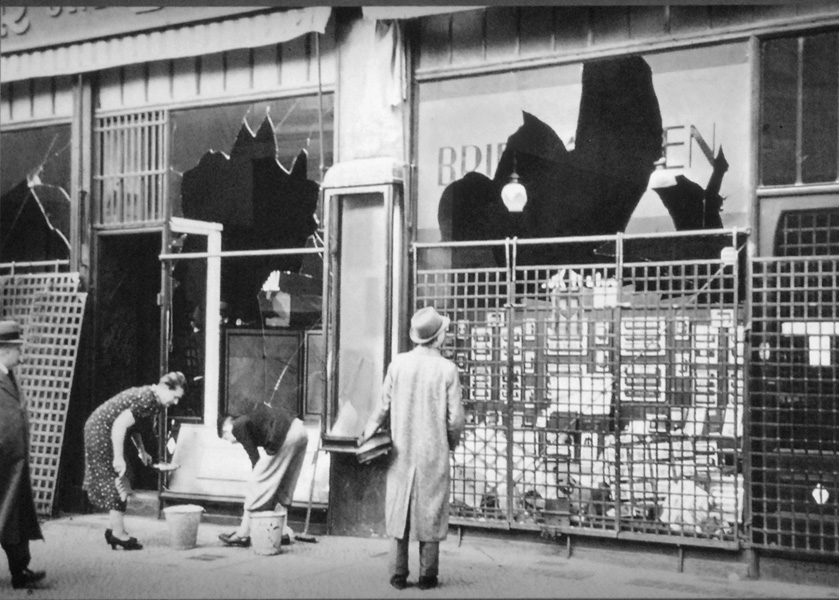
Eighty years ago today, thousands of Jewish synagogues, businesses and homes all over Germany were vandalized and set on fire as firefighters, under orders from Gestapo leaders, stood by. The violent anti-Semitic demonstrations that would leave 91 Jews dead and approximately 30,000 arrested and sent to concentration camps is known as Kristallnacht (“Crystal Night” or “The Night of Broken Glass”), after the shards of broken glass that littered the streets afterwards.
The pogrom was a tipping point for the Third Reich, sparking an escalation of persecution into violence that would eventually culminate in the Final Solution.
As we grapple with questions of how best to remember the Holocaust as the last survivors pass away, writing, art, and music remain as an enduring testament. Below is a selection of music by Jewish composers and performers, many directly connected to the events of Kristallnacht, to observe the 80th anniversary of the fateful event.
Mordecai Gebirtig: “Undzer Shtetl Brent!” (“Our Town is Burning!”)
https://www.youtube.com/watch?v=LLZLVtPU5Xg
Two years before Kristallnacht, a Polish carpenter and songwriter named Mordecai Gebirtig wrote “Undzer Shtetl Brent” in response to a 1936 pogrom in Przytyk, Poland. The tune was soon adopted as the anthem for Krakow’s underground Jewish resistance, and while the song’s lyrics were meant to inspire action against Nazi violence, they are also eerily prophetic of what was yet to come. Gebirtig was killed in 1942 during a deportation from the Krakow ghetto. The video above is a performance of “Undzer Shtetl Brent” by Netania Davarth with Robert deCormier and His Orcherstra.
Heinrich Heine: “Die Lorelei” (set to music by Franz Liszt)
https://www.youtube.com/watch?v=era5jL4wlx0
On Nov. 15th, 1938, days after Kristallnacht, the following two sentences ran in the Los Angeles Times: “Germany’s best known folk song, Lorelei, has been banned by the Nazi educational department because the words were written by a Jew, Heinrich Heine. The department classified seven others as ‘songs we do without,’ including Mendelssohn’s ‘I Raise Mine Eyes Unto the Stars.'”
As one of the most influential German poets of the 19th century, Heine’s words were set to music by the likes of Robert Schumann, Franz Schubert and Franz Liszt before being banned by the Nazis. Above is Liszt’s 1841 setting of “Die Lorelei.”
Menahem Pressler and the Berlin Philharmonic perform Wolfgang Amadeus Mozart: Piano Concerto No. 17 in G, K. 453 (sel.)
https://www.youtube.com/watch?v=QeRMPBXiW2E
The day after his father’s clothing store in Magdeburg, Germany was destroyed during Kristallnacht, 15 year-old Menahem Pressler practiced piano as usual. He would later describe his need to fulfill his “inner desire to make music” amidst fleeing with his family to Italy and then Israel. Pressler went on to become a founding member of the Beaux Arts Trio, and in 2008, he returned to Germany for the 70th anniversary of Kristallnacht. Above is Pressler in 2014, making his debut with the Berlin Philharmonic at age 90.
John Zorn: Kristallnacht
https://www.youtube.com/watch?v=fSgfeHDdT5w
Experimental musician John Zorn’s 1992 album, Kristallnacht, is a suite of seven compositions reflecting on the events before, during and after the two nights of terror that inaugurated the Holocaust. Using a mixture of music and existing sound, Zorn creates a sonic journey that is at times haunting and breathtaking, and at times nearly impossible to listen to.
In the album’s opening track, “Shtetl (Ghetto Life),” Zorn weaves together Jewish klezmer melodies, experimental playing and recordings of rally speeches shouted in German, creating a building tension that leads into the next track, “Never Again.”
Here, violence committed against the Jews during Kristallnacht is translated to an assault of sound for listeners. The work opens with a relentless loop of shattering glass, and Zorn notes it “contains high frequency extremes at the limits of human hearing and beyond, which may cause nausea, headaches and ringing in the ears.”
The album is not an easy listen, but it is an honest exploration how music can embody and illustrate trauma.
Ödön Pártos: “Yizkor (In Memoriam)”
https://www.youtube.com/watch?v=ILPyde96jJc
Ödön Pártos was playing in a Berlin orchestra when Hitler rose to power, prompting the Hungarian-Israeli violist to returned home to Budapest. When Bronisław Huberman founded the Palestine Philharmonic, an ensemble comprised of Jewish musicians persecuted by Nazis, he recruited Pártos to play principal viola. Pártos died in 1977 but remains a celebrated Israeli composer, having been the first musician to be awarded the Israel Prize in 1954. “Yizkor” is Pártos’ 1947 ode to Holocaust survivors, performed here by
Tune in to 91Classical tonight at 6 p.m. for an hour of music dedicated to Kristallnacht rememberance.
